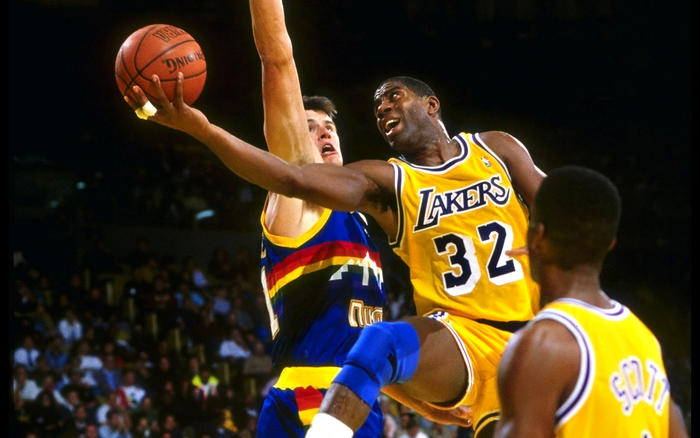As the 1980s began, Los Angles had a surplus of flash and fury.
There was movie magic, music magic and … well, regular magic. What was missing was something on the sports side; then Earvin “Magic” Johnson (shown here) joined the Los Angeles Lakers.
The result? Four decades later, “he’s still the most popular athlete in Los Angeles,” Jimmy Kimmel says in “They Call Me Magic,” the four-part documentary that debuts Friday (April 22) on Apple TV+.
Others in the film have their own adjectives. Johnson is “mythological” (Samuel L. Jackson) … His passes “make it seem like he’s clairvoyant” (Kareem Abdul-Jabar) … “He was an oxymoron; he could play any position” (former Laker Coach Pat Riley) … And “he played with such joy” (Grant Hill).
It was that joyfulness that stood out on the basketball court, Adam McKay said in a Television Critics Association press conference for another project. Johnson had “this blend of joy and skill …. We know the smile, we know the incredible (on-court) creativity, but he was (also) a winner.”
Larry Bird had virtually all of Johnson’s skills, but not his joy. At various times, either man might prevail.
Johnson’s college team (Michigan State) beat Bird’s (Indiana State) for the national title. In the pros, Bird beat Johnson for rookie-of-the-year. Their teams collided in the play-off finals three times; Johnson’s Lakers won twice, Bird’s Boston Celtics won once. “We were blessed to have each other and be in that rivalry,” Johnson said in a TCA press conference for the Apple film.
Overall, Johnson won five NBA titles with the Lakers. When ESPN picked the top North American athletes of the 20th century, it put him at No. 17; among basketball players, he trailed Michael Jordan (No. 1) and Wilt Chamberlain (13), but led Jabbar (26) and Bird (30).
So it’s logical that there should be a film about Johnson. “People had come to me before and wanted to do” one, he told the TCA. “But I felt the timing wasn’t right.”
That changed when “Last Dance” – about Jordan and the Chicago Bulls – made a big impact in the early days of the Covid lockdown. “Then everybody just said, ‘Hey, you’ve got to do yours,’” Johnson said.
After that long wait, two projects have arrived almost simultaneously. McKay’s – “Winning Time: The Rise of the Lakers Dynasty” – is a scripted mini-series, at 9 p.m. Sundays on HBO and rerunning often; it continues through May 8 and is also on HBO Max. “Call Me Magic” is a documentary, with all four parts arriving April 22 on Apple.
Both projects describe a joyful life, but include the dark moments. Johnson told the TCA about “crying when (Lakers owner) Dr. Jerry Buss (died). I was there when he was dying, his last day.” And he answered questions about the historic day – Nov. 7, 1991 – when he announced that he had tested positive for the HIV virus.
“I’m all about winning,” Johnson said. So he was careful to “ask my doctors, ‘What do I have to do to be able to live for a long time?’ Everything that they told me – take my meds, have a positive attitude, work out – I did those things. (But) I was giving up the game that I love, basketball, and that was hard for me.”
He returned to it occasionally – the Olympic “dream team,” a barnstorming team, a brief NBA comeback—but tried other things.
One idea – a syndicated TV show – flopped. “I’m not a late-night host,” Johnson said. “I love being a businessman, and I’m going to just stay in that lane right now.”
He opened Starbucks and Pepsi franchises and had strong success with movie theaters in underserved Black areas. Now he’s one of the owners of the Dodgers – the same team that brought Blacks to major-league baseball. “You think about Jackie Robinson being the first one, and then here I am, one of the only African-American baseball owners.”
He has survived and prospered for 30 years after testing positive. That’s “because of my support system – my wife Cookie, my kids, my parents, my brothers and sisters (and friends). It’s been an amazing journey.”
